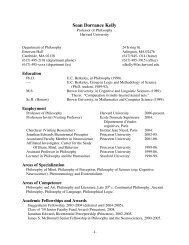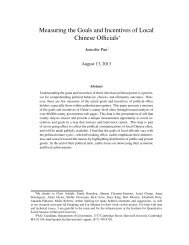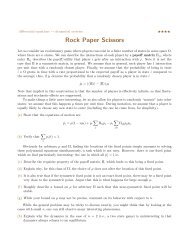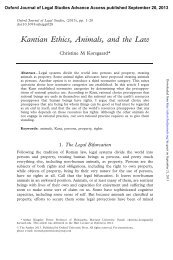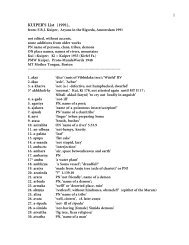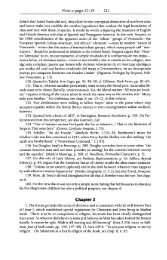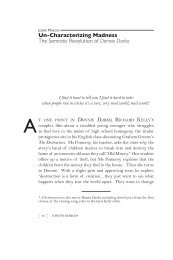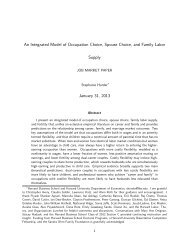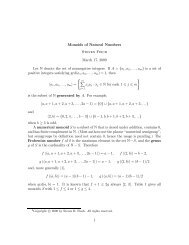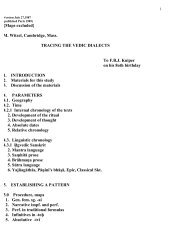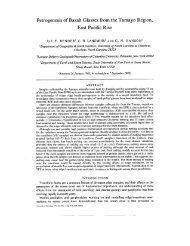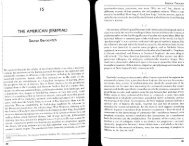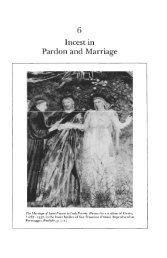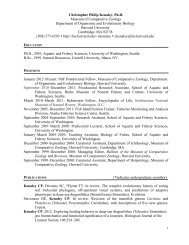Children of Adoption - People Fas Harvard
Children of Adoption - People Fas Harvard
Children of Adoption - People Fas Harvard
You also want an ePaper? Increase the reach of your titles
YUMPU automatically turns print PDFs into web optimized ePapers that Google loves.
<strong>Children</strong> <strong>of</strong>' <strong>Adoption</strong><br />
In Hamlet, as in Antigone, not death to the world and spiritual mar-<br />
riage to Jesus (i.e., entering a nunnery, which in some orders entailed<br />
a service for the dead before rebirth and marriage to Jesus), but be-<br />
coming nothing in death homogenizes the members <strong>of</strong> the domestic<br />
household.* In Measure for Measure, by contrast, from the virtual inevi-<br />
tability <strong>of</strong> incest and lack <strong>of</strong> restraint that she sees almost everywhere<br />
in the secular world, Isabella seeks refuge in an institution where,<br />
more subject to a Mother Superior than to the memory <strong>of</strong> a conceiv-<br />
ably adulterous mother and more subject to Brothers than to a lecher-<br />
ous brother, she hopes to transcend sexual desire and specific famil-<br />
ial blood ties. She seeks to become a "chylde <strong>of</strong> adopcyon" (Rom. 8: 23,<br />
trans. John Bale) to God.<br />
To take vows in a Sisterhood is radically to change one's relationship<br />
to everyone in the world, including the members <strong>of</strong> one's blood family.<br />
"If any one comes to me and does not hate his own father and mother<br />
and wife and children and brothers and sisters, yes, and even his own<br />
life," said Jesus, "he cannot be my disciple" (Luke 14: 26; Rev. Stand.).20<br />
Pope Innocent IV's description <strong>of</strong> how Saint Clare divorced her earthly<br />
family before joining the heavenly one is thus typical <strong>of</strong> Christian<br />
morlachal tradition:<br />
Meditating on this verse <strong>of</strong> the Prophet, "0 daughter, hear, see, and listen,<br />
forget your people and the house <strong>of</strong> your father, because the King has de-<br />
sired your beauty," the Blessed Clare <strong>of</strong> saintly memory . . . turned her back<br />
to fleeting, and transitory things. Divesting herself <strong>of</strong> herself, her parents,<br />
and <strong>of</strong> all things, and making herself a daughter <strong>of</strong> the celestial Kingdom, she<br />
elected and named as her spouse the poor Jesus Chri~t.~'<br />
Before entering a Christian Sisterhood and becoming a child <strong>of</strong> adop-<br />
tion to God, a woman is allowed to distinguish brothers from others<br />
*In Hamlet, ambiguous family relationships become inseparable from ambiguous<br />
political relationships. This conflation is summed up in the figure <strong>of</strong> Gertrude, who<br />
stands to the political ruler in the same mixture <strong>of</strong> relations as a nun stands to God,<br />
being not only ambiguously sister and wife <strong>of</strong> Claudius but also mother <strong>of</strong> the potential<br />
king Hamlet. In one <strong>of</strong> Shakespeare's sources (Belleforest, Histoires tragigues, 5th series,<br />
gd story, chap. I), she is also the daughter <strong>of</strong> a king, from whom she receives the king-<br />
dom as a kind <strong>of</strong> dowry. Thus she is "imperial jointress to . . . the state" both as a<br />
woman who has a "'joint' tenancy in an estate" (cf. Coke, On Littleton, L. I ; C. 5; 36.D) in<br />
such a way that he who would be king <strong>of</strong> the state rrlust marry its queen, or kill her-<br />
thus being in the same position as Jocasta-and as a woman who conjoins the vari-<br />
ous successivc parts <strong>of</strong> the royal family and hence <strong>of</strong> the state. Tellingly, on entering<br />
Gertrude's chamber, Hamlet compares himself to Nero: "Let not ever 1 The soul <strong>of</strong><br />
Nero enter this firm bosom" (HAM 3.2.378-79). Nero's incest with his mother, Julia<br />
Agrippina Minor, conflated in his person two <strong>of</strong> her relations as mother, sister, wife,<br />
and daughter <strong>of</strong> emperors; he enacts both the incest Hamlet may fear he desires and<br />
the matricide Hamlet may fear he will commit. Scc my forthcoming essay "Hoodman<br />
Blind."



